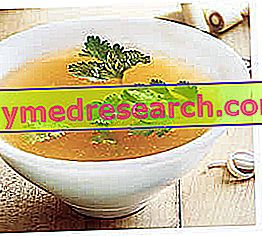Renal colic is a ferocious pain in the urinary tract, essentially due to the passage of stones through the ureter (a thin conduit that carries urine from the kidneys to the bladder). In turn, these small agglomerates of mineral salts (kidney stones) constitute a block to the free flow of urine in the urinary tract, responsible for the very painful muscle spasms that characterize colic.
Pain - a characteristic symptom of renal colic - is often associated with hematuria (blood in the urine), fever, hypotension, intense sweating, nausea and vomiting.
Kidney stones can also run completely asymptomatically.
What to do
- Water shot: very effective remedy to favor the spontaneous elimination of the renella and smaller size kidney stones, facilitating the resolution of renal colic; it is instead contraindicated in the case of large calculations
- Drinking plenty of fluids (2-3 l / day) is an effective remedy against kidney colics dependent on stones. By drinking a lot of water, the substances present in the urine are widely diluted; consequently, the chances that the mineral salts precipitate and form agglomerates (calculations, therefore colic) are minor
- Prefer mineral water or minimally mineralized water (to limit calcium and sodium intake)
- Take a pharmacological treatment from the earliest symptoms to prevent the pain from becoming unbearable
- Adequate rest
- Refine the diet
- Take yogurt with live lactic ferments or a probiotic in case of antibiotic administration
- Reduce stress. Although discounted, decreasing daily tensions is a fairly good remedy to relieve colic pain
- Recurrent renal colic requires specific diagnostic tests. A single episode of renal colic should not alarm too much (although medical consultation is always recommended)
- Diving in a very hot (almost boiling) pool of water is an effective remedy to alleviate the spastic contraction of smooth muscles. Let us remember briefly that heat exerts a vasodilatory effect; by doing so, spastic pain is mitigated
What NOT to do
- Drink alcohol
- Hot baths during renal colic associated with blood in the urine. In similar situations, heat favors bleeding
- Temporeggiare: when a renal colic is suspected, it is recommended to seek immediate medical attention to start any specific treatment as soon as possible
- Drink a little water
- Drink water rich in mineral salts
- Drink carbonated drinks
- Take too many protein-rich foods
- sedentary
- Megadoses of vitamin C. An intakes of vitamin C can increase the concentration of oxalates in the urine, therefore favoring the formation of kidney stones. Vitamin C should be taken in the right doses.
What to eat
- Colics dependent on kidney stones cannot be resolved by using only a specific diet. However, consumption of some foods rather than others can significantly improve symptoms or prevent recurrent renal colic:
- Take lots of fruit and vegetables, as it is rich in antioxidants (vitamin C and E).
- Take fruit rich in vitamin C. Ascorbic acid - taken in weighted quantities - is a useful food remedy to inhibit the formation of kidney stones. Do not abuse vitamin C: an excess of vitamin C favors the opposite effect.
- Urinary alkalizing foods: potassium citrate and magnesium citrate
- Milk and dairy products (in moderation)
- Whole foods and fiber
- Lemon juice: effective food remedy as it contains 5-7% citric acid. Don't abuse.
- Onion, celery, artichoke, nettle and parsley
What NOT to Eat
- Coffee, tea, fruit juices and other foods rich in oxalates (to be avoided especially in the case of renal colic associated with calcium oxalate stones)
- Meat (limiting consumption) and foods rich in the amino acid methionine
- Anchovies, herring, sardines, crustaceans, offal (in the case of colic dependent on uric acid stones)
- Beets, beets, spinach and parsley (source of oxalates)
- Too salty foods (take max. 6-8 g of salt / day)
- Cocoa (food rich in oxalates)
- Desserts (limit consumption)
- Excess Vitamin C (an abuse of this vitamin favors the formation of kidney colic dependent on stones)
- In general, the diet to prevent stones and renal colic should be adapted to the type of stones to which the patient is subjected. The adoption of some dietary remedies may therefore prove to be appropriate in some cases and contraindicated in others. To clarify ideas, we recommend reading the article: diet and kidney stones. Consult your doctor.
Natural Cures and Remedies
To speed healing, it is recommended to take herbal teas formulated with active ingredients extracted from these plants:
- Cape gooseberry ( Physalis alkekengi L.) → mainly diuretic, depurative and laxative properties. Due to its therapeutic potential, the cape goose is widely used as a natural remedy for renal colics dependent on uric acid stones
- Birch ( Betula alba L.) → diuretic and anti-inflammatory properties
- Goldenrod ( Solidago virgaurea ) → diuretic, astringent and anti-inflammatory properties of the urinary tract
- Rusco ( Ruscus aculeatus ) → used in phytotherapy in the treatment of renal colics due to its diuretic and anti-inflammatory properties
- Spiny ononide ( Ononis spinosa ) → diuretic and spasmolytic properties on the smooth muscles of the urinary tract
Pharmacological care
- NSAIDs (non-steroidal anti-inflammatory drugs):
- Ketorolac trometamina (eg Toradol)
- Paracetamol or acetaminophen (eg Tachipirina, Buscopan compositum), a pharmacological remedy particularly indicated for renal colic associated with fever
- Diclofenac (eg Fastum, Dicloreum)
- Antispasmodic drugs: excellent remedy to appease muscle spasms generated by renal colics and relax genito-urinary muscles:
- Colic antispasmin consists of belladonna and papaverine hydrochloride
- Antiemetic drugs: indicated to relieve vomiting and nausea associated with renal colic
- Scopolamine butyl-bromide (eg Addofix)
- Antibiotics: indicated when renal colics depend on bacterial infections
Prevention
- Drinking lots of water (even three liters a day) is a good remedy to prevent kidney colic in patients predisposed to stones
- Taking herbal teas with diuretic action is an effective remedy to prevent kidney colics due to stones
- Perform physical exercise constantly
- Follow a healthy and balanced diet, limiting the consumption of foods rich in oxalates
Medical treatments
When renal colic is caused by the presence of excessively large kidney stones, the only conceivable remedy is surgical removal:
- Extracorporeal lithotripsy: it allows the crushing of the colic responsible calculation by means of a beam of shock waves that breaks on the surface of the calculation
- Intracorporeal lithotripsy: it involves the elimination of the calculation by means of a minimally invasive endoscopic surgery
- Uretrorenoscopy: a small probe inserted via trans urethral shatters the calculation with ultrasound or laser
- Percutaneous renal arthritis: the calculus responsible for renal colic is crushed. The fragments are extracted through an instrument inserted through a micro-hole made in the patient's side
- Open surgery: extreme remedy to treat kidney colics due to severe stones



